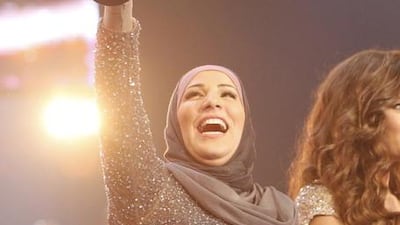Saturday night was an evening of many firsts for the popular television reality show The Voice Ahla Sawt: the hijab-clad Nedaa Shrara from Jordan became the first woman to win on MBC's Arabic version of the competition.
Throughout the three-hour episode, which was filmed live in Beirut at the MBC studios, her mentor, Egyptian star Sherine Abdel-Wahab, was insistent that Shrara would win the third season, and said that viewers “all have enough good sense and know better, and will make sure she wins and they won’t disappoint me”.
It was a testimony to how good Sharar was that the other judges – Iraqi great Kadim Al-Sahir, Lebanese pop star Assi El Hallani and Tunisian singer Saber Rebaï – did not once begrudge Abdel-Wahab her confidence.
But not many know that 23-year-old Shrara, who teaches children with special needs, did not apply to audition of her own accord.
"I was surprised to learn that my friends and family had sent in an audition tape in without telling me," said Shrara. "I was so happy to hear that I was chosen to audition, because I knew it was the only way to make my dreams come true. I came to The Voice with one goal: to win."
According to MBC, 150 million viewers across the Middle East tuned in to watch the third season of The Voice, which ran over every Saturday for 14 weeks.Both #MBCTheVoice and #NedaaShrara were among the top 10 trending hashtags in the region.
Abdel-Wahab is not surprised by the show’s popularity.
“All of us judges are just so thankful – we thank God – that despite everything that is happening these days in life in this region, we as a programme are still able to find a way to bring a smile to people’s faces,” she said.
Abdel-Wahab has always placed great store in smiles, and made a point early on in the show to admonish Shrara for lack of expression when singing.
“I’ll never forget when Sherine told me I have to smile,” said Shrara. “She said it wasn’t nice for the audience when I don’t smile when I sing and don’t show how much I enjoy it. My confidence grew, I started singing with joy. I think I wouldn’t have come this far if it weren’t for Sherine’s mentoring.”
During the course of the show, Abdel-Wahab revealed that Shrara has been estranged from her father ever since she left Jordan to take part in The Voice.
"From the moment Nedaa came to The Voice, her father hasn't spoken to her and doesn't agree with what she's doing," said Abdel-Wahab. "I want to say that, despite all the temptations she grapples with daily on this show, Nedaa has stuck to her convictions and beliefs, has always dressed in accordance with her hijab and her modesty, has always been true to her values. I want to tell her father, your daughter is a role model on this show and makes us all proud that she has been here."
More firsts for the show included an opening-sequence performance during the finale by a group of young children, who sang an Arabic version of Michael Jackson's We Are the World alongside the four finalists Shrara, Lebanese Christine Said, Iraqi Ali Youssef and Tunisian Hamza Fadhlaoui.
The children are future contestants on the debut programme The Voice Kids, which will begin broadcasting on Saturday. The judges are Lebanese diva Nancy Ajram, Egyptian singer and actor Tamer Hosny, and Al-Sahir.
Al-Sahir had his own "first" during the finale, performing in English for the first time in his 30-year career. Al-Sahir had composed music to the words of On Love by Gibran Kahlil Gibran. He said it was a project he has been working on for two years.
• To watch a rerun of the finale of The Voice Ahla Sawt, visit www.shahid.net. The first season of The Voice Kids will make its debut at 10pm on Saturday on MBC1 and MBC Masr
artslife@thenational.ae

